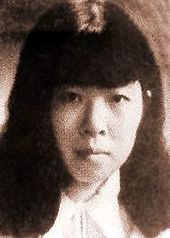Xiao Hong
Xiao Hong (萧红, Xiāo Hóng , also Hsiao Hung , born June 2, 1911 in Hulan ; † January 22, 1942 in Hong Kong ) was a Chinese writer , author of novels and short stories and poet. She lived during the Chinese Civil War and the Japanese occupation of China. Although her writing career was extremely short, her work had a profound influence on later generations of writers in China.
Life and work
Xiao Hong was born in what was then Hulan County (now the Harbin District ) in Heilongjiang Province under the name Zhāng Nǎiyíng (张乃莹). Her parents' house was traditional, feudal and owned a large piece of land. Girls were of little value in the family. Her mother died when Xiao Hong was a young child. In 1926 she began attending a girls' school in the provincial capital Harbin, where she came into contact with the works of Lu Xun , Xie Bingxin and Upton Sinclair .
After her father arranged for her to marry, Xiao Hong fled to Beijing . In 1932 she returned to Harbin and met the young writer Xiao Jun (萧军) there. They published their first works in the Harbins newspapers, and in 1933 they published Bashe , their first book, which contained a collection of short stories, at their own expense .
In 1934, the two of them left Harbin , which had been occupied by the Japanese, and went to Shanghai via Qingdao . There they came into the revolutionary literary scene and made friends with the important writer Lu Xun . With Lu Xun's help, Xiao Hong published the book The Place of Life and Death in 1935 . It contained a foreword by Lu Xun and was the first book Xiao Hong published under her pseudonym. At the same time it was the book with which she achieved her literary breakthrough. It was one of the first literary works that dealt with the lives of people in the Japanese-occupied territories.
A series of short stories followed until she went to Japan in 1936 for health reasons . After the outbreak of the Sino-Japanese War in 1937, she returned to China, but was mostly on the run from the Japanese troops. In 1940 she moved to Hong Kong with Duanmu Honglian . Although she already knew she was sick, she started working on a trilogy. In 1942 her second famous book, Tales of the Hulan River , was published, which describes the life of the people in their homeland Hulan , their feudal traditions, rites and festivals and does not hide the cruel aspects. She died in 1942 shortly after Hong Kong was invaded by the Japanese.
Works
- 跋涉 (Bashe), 1933 (with Xiao Jun)
- 生死 场 (Sheng si chang), 1935 - The place of life and death
- 会议 鲁迅 先生 (Huiyi Lu Xun Xiansheng), 1940
- 马伯 乐 (Ma Bole), 1940
- 呼兰河 传 (Hulanhe zhuan), 1942 - Stories from the Hulan River , German by Ruth Keen
- Selected stories of Xiao Hong, translated by Howard Goldblatt. Beijing: Chinese Literature, 1982
Web links
- Literature by and about Xiao Hong in the catalog of the German National Library
| personal data | |
|---|---|
| SURNAME | Xiao Hong |
| ALTERNATIVE NAMES | 萧红; Hsiao Hung |
| BRIEF DESCRIPTION | Chinese writer , novelist and short story writer , and poet |
| DATE OF BIRTH | June 2, 1911 |
| PLACE OF BIRTH | Hulan |
| DATE OF DEATH | January 22, 1942 |
| Place of death | Hong Kong |
